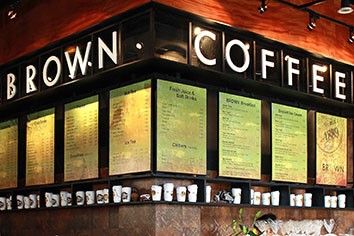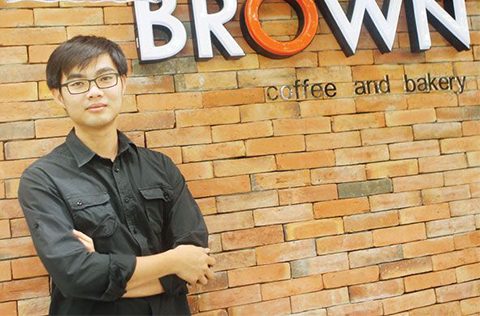
Brown Coffee, a symbol and success story of young Cambodian entrepreneurship.
A new crop are bursting onto the country’s business scene and showing the way for sustainable economic growth, reports Scott Rawlinson.
On 16 March, Prime Minister Hun Sen expressed his disappointment at foreign journalists who, painted Cambodia as a sort of “hell”.
At the same time, democracy and human rights forecasts for the Southeast Asian nation are frequently gloomy. For example, see this report from USAID published in January.
Regardless of the merits of either side of the argument, the story of Cambodia since the fall of the Khmer Rouge is one that is much more complicated and multifaceted, defying easy and universal classification. In fact, there is not so much a Cambodian story as a multitude of Cambodian stories.
In particular, young Cambodians without memories of the Khmer Rouge’s brutal reign are forging new narratives. Since the 2013 National Assembly elections, and the shock experienced by the long-incumbent Cambodian People’s Party (CPP), the need to appeal to youth and capture their imaginations has risen in the party’s political agenda and strategies.
Prior to the 2013 election, the opposition Cambodia National Rescue Party (CNRP) made effective use of various social media platforms, gaining much support from young urbanites in Phnom Penh and its surrounding areas. In response, the CPP, and in particular Prime Minister Hun Sen, became much more active on Facebook, giving users the chance to watch live streams from various public works and graduation ceremonies as well as the opportunity to follow the day-to-day activities of the prime minister and his interactions with — often young — Cambodians.
Nevertheless, it would seem that young Cambodian entrepreneurs are taking matters into their own hands. At a special public lecture hosted by the Cambodian Institute for Strategic Studies (CISS) I was fortunate enough to attend a presentation on the ASEAN Economic Community and its implications for Cambodian entrepreneurs delivered by HE Dr Sok Siphana — an advisor to the Royal Government of Cambodia.
Following the fall of the Khmer Rouge regime infrastructure and business, among many other things, had to be rebuilt from scratch. Throughout the Vietnamese occupation, the intervention of the UN and the shift towards privatisation, Cambodia witnessed the (re-)emergence of powerful business tycoons as well as the smaller family-run stalls that remain a common site throughout the country.
According to Dr Sok Siphana, what many of these early businessmen and women lacked was formal education and training, robust accounting procedures, and the ability to communicate in the languages of international trade, particularly English.
This state of affairs underwent huge changes in the post-1993 era. The provision of scholarships to talented Cambodian youths, giving them the opportunity to study abroad, raised the human resources and capacity available to Cambodia. Now a number of Cambodians study in universities elsewhere in Asia, the European Union, the US and Australia, attending a number of prestigious institutions.
Of course there remains the issue of a possible “brain drain”. It is not always guaranteed that Cambodian students who opt to study abroad will necessarily wish to set up their business or work back in Cambodia once their degrees are completed.
However, with this growth in the number of tertiary-level educated Cambodians and the enthusiastic embrace of social media and other new technologies that act as business aids, young Cambodian entrepreneurs with knowledge and business plans are already and are likely to continue to transform the nation’s economy.
Additionally, organisations such as the Young Entrepreneurs Association of Cambodia (YEAC) provide a community for accomplished and aspiring businessmen and women to exchange ideas and advice with one another.
There are a few notable success stories.
A perfect example is Brown Coffee a thriving coffee and bakery chain with a number of outlets across Phnom Penh and which was co-founded by five young Cambodians with formal education, practical skills and a robust business model. One of its co-founders, for instance, studied education and communications, another is an architect, still another a pastry chef as well as two structural engineers. While serving both expatriates and locals it employs many local Cambodians.
Whether legislation from the government keeps up the pace with the private sector and the influx of ideas-full prospective entrepreneurs is something we will discover in the future.
It would be na├пve to think that Cambodia has solved all of its social and political issues and ills that act as a hindrance to a more equal form of national development. However, young Cambodian entrepreneurs are lighting the way for a more sustainable and localised form of economic growth.
I hope that success stories like Brown Coffee act as an inspiration for this and the next generation of young Cambodian entrepreneurs.
Scott Rawlinson received his MA in South East Asian Studies from the School of Oriental and African Studies (SOAS), University of London. He is currently a Fellow, and Coordinator for Fellows, at the Cambodian Institute for Strategic Studies (CISS), Phnom Penh, and will commence his PhD at SOAS in September 2016. All opinions are those of the author and do not necessarily reflect the views of the Institute.
 Facebook
Facebook  Twitter
Twitter  Soundcloud
Soundcloud  Youtube
Youtube  Rss
Rss 